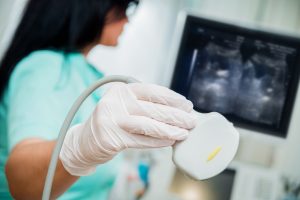
Date: Tuesday, April 25th
Time: 8am – 2pm (appointments will be scheduled first available and will be 30 minutes to 1 hour)
SAVE $30 on abdominal or heart ultrasounds! SAVE $60 if both abdominal and heart ultrasounds are performed! Savings are per pet. Cannot be combined with any other offers.
Dr. Amy Haase is the co-owner of Charlotte Veterinary Surgical Services, which provides mobile surgical and ultrasound services for general practices in the Charlotte and South Carolina area. Dr. Haase has worked with us since we opened and has helped us to provide advanced diagnostics for our patients.
Why We Use Ultrasound
Ultrasound utilizes sound waves to capture live images and video of the internal organs of the pet’s body. The captured video enables the veterinarian to see details such as structure, movement, and blood flow not normally seen in x-ray. In the course of examining your pet’s organs, it is common to find masses, which could be benign (normal part of aging and not cancerous) or malignant (cancerous). A fine needle aspirate (biopsy) would need to be performed to determine type. Ultrasound is a great tool for early detection of organ abnormalities and masses not normally found in routine examinations and blood work to ensure the best prognosis for your pet.
Abdominal Ultrasound
Abdominal ultrasounds check all of the organs in your pet’s abdominal cavity — liver, kidneys, gallbladder, pancreas, adrenal glands, bladder, spleen, and small intestine. It is commonly used to help diagnose Cushing’s Disease, gallbladder stones, inflammatory bowel disease, and lymphoma and other cancers.
Heart Ultrasound (Echo)
A heart ultrasound, also known as an Echo or Echocardiogram, examines the structure and function of the heart and associated vessels. It is commonly used to help diagnose heart disease, heart masses, and the root cause of a heart murmur.
What to Expect
Ultrasounds are a safe, non-invasive, and painless procedure. Your pet will NOT be required to be anesthetized but some pets may require sedation. The area being diagnosed will need to be shaved so as to promote good contact between the ultrasound probe and your pet’s skin. We hope you understand that due to the size of the room and the technical aspects of performing an ultrasound exam, we do not permit pet parents to accompany their pet to the ultrasound room.
Once the procedure is complete we will discuss any preliminary findings with you and follow up with a detailed report within 24-48 hours.

